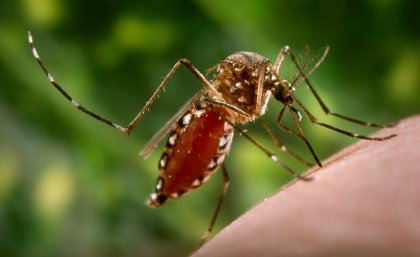
Kick-starter funding of $50,000 has helped unite Brisbane-based researchers in the battle against Zika virus.
Researchers at The University of Queensland and the QIMR Berghofer Medical Research Institute are using a $50,000 Australian Infectious Diseases Research Centre grant to develop new weapons against the devastating virus.
UQ School of Chemistry and Molecular Biosciences Head Professor Paul Young said the UQ and QIMR Berghofer teams were contributing to international efforts to deal with the epidemic sweeping through South American countries and threatening to spread further.
“This timely funding will help build our local collaboration,” he said.
Professor Young said the mosquito-borne viral disease was responsible for millions of cases of fever, rash, joint pain and conjunctivitis, and had been linked to abnormalities in brain development in newborns.
“Zika is of particular relevance to Queenslanders as it is carried by the Aedes aegypti mosquito,” he said.
“As this mosquito is prevalent in North Queensland, there is a real risk of Zika outbreaks in the north of the State.”
QIMR Berghofer researchers will assess the competence of Australian mosquito populations to transmit a variety of Zika strains under different climate conditions. They will also look at virus interactions with the Asian Tiger Mosquito, Aedes albopictus, which is currently implicated in a dengue outbreak in Queensland’s Torres Strait islands.
Professor Young is working with fellow virologists Professor Alexander Khromykh, Professor Roy Hall and Dr Helle Bielefeldt-Ohmann at the Australian Infectious Diseases Research Centre and the School of Chemistry and Molecular Biosciences, and Professor Greg Devine and Professor Andreas Suhrbier at QIMR Berghofer.
The researchers have a solid track record in developing diagnostic tests, antiviral drugs and vaccines against other mosquito-borne diseases such as dengue, West Nile and Chikungunya.
Professor Young said the team was working to develop rapid and portable laboratory tests to detect Zika infection in people returning to Australia from Zika outbreak areas, and to monitor local mosquitoes for the virus.
“We are also using technologies developed at UQ in work to produce a new generation of diagnostics, vaccines and antiviral drugs against Zika virus,” he said.
“Our combined expertise in mosquito-borne viruses gives us a distinct advantage in teasing out the events that lead to foetal abnormalities when women are infected early in their pregnancy,” Professor Young said.
The UQ and QIMR Berghofer researchers are collaborating with other Queensland-based research groups at Queensland Health, the University of Sunshine Coast and the Mater Research Institute.
Media: Professor Paul Young, p.young@uq.edu.au, +61 7 3365 4622; Professor Alexander Khromykh, alexander.khromykh@uq.edu.au, +61 7 3346 7219; Professor Roy Hall, roy.hall@uq.edu.au, +61 7 3365 4647; QIMR Berghofer media, +61 7 3845 3919, media@qimrberghofer.edu.au









